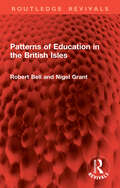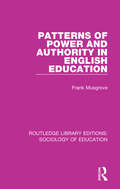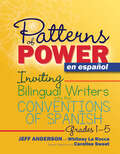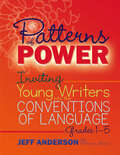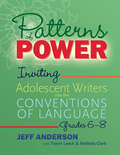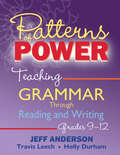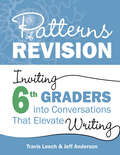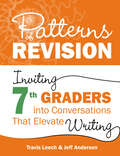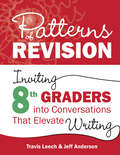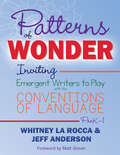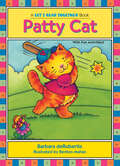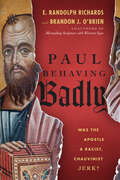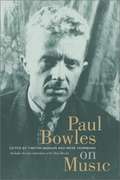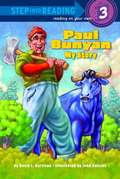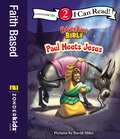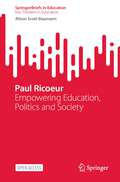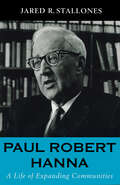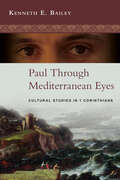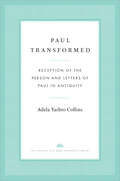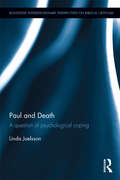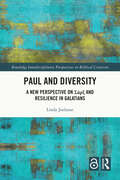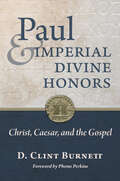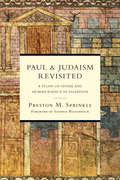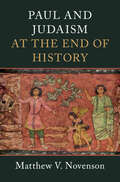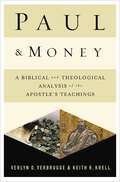- Table View
- List View
Patterns of Education in the British Isles (Routledge Revivals)
by Robert Bell Nigel GrantFirst published in 1977, Patterns of Education in the British Isles is the first modern discussion of the educational systems of the British Isles and the ways in which they influence each other. It is no arid account of administrative structures but the first major attempt to set the systems in their cultural, political, and historical context, and to relate them to each other.The book discusses the extravagant claims sometimes made for Scottish education, the often-neglected merits of Irish education, and the fortunes of the Celtic languages; it examines the peculiar problems of the remote areas, the offshore islands, and the politics of the educational profession. Although particularly concerned with the non-English systems of these islands, it also considers their relationships with education in the rest of Europe and the world beyond.
Patterns of Power and Authority in English Education (Routledge Library Editions: Sociology Of Education Ser. #41)
by Frank MusgroveFirst published in 1971, this book argues that schools at the time were underpowered, due partly to circumstances within contemporary educational institutions, but chiefly to their relationships with the wider social environment. It suggests that schools lacked bargaining power and that their position deteriorated because they had marketed an ev
Patterns of Power en español, Grades 1-5: Inviting Bilingual Writers into the Conventions of Spanish (Patterns of Power)
by Jeff Anderson Whitney La Rocca Caroline SweetAuthor Jeff Anderson and bilingual teacher and coach Caroline Sweet lead a vibrant approach to grammar instruction in Patterns of Power en español, Grades 1-5: Inviting Bilingual Writers into the Conventions of Spanish. Here, young, emergent writers are invited to notice the conventions of the Spanish language and build off them in this inquiry-based approach to instructional grammar. The book comes with standards-aligned lessons that can be incorporated in just 10 minutes a day. Patterns of Power’s responsive, invitational approach puts students in an involved role and has them explore and discuss the purpose and meaning of what they read. Students study short, authentic texts and are asked to share their findings out loud, engaging in rich conversations to make meaning. Inside you’ll find: Ready-to-use lesson plan sets that include excerpts from authentic and diverse Spanish mentor texts curated for grades 1-5 and can be adapted over 5 grade levels Real-life classroom examples, tips, and Power Notes gleaned from the authors’ experiences that can be applied to any level of writer Resources, including a Patterns of Power Planning Guide adapted for Spanish, to use in classroom instruction or as handouts for student literacy notebooks How to correlate to Spanish TEKS, Common Core, and other state standards Patterns of Power en español, Grades 1-5 provides a simple classroom routine that is structured in length and approach, but provides teachers flexibility in choosing the texts, allowing for numerous, diverse voices in the classroom. The practice helps students build cognitive recognition and provides a formative assessment for teachers on student progress. With these short lessons, students will gain confidence and move beyond limitation to produce effortless writing in your class and beyond. The Patterns of Power series also includes Patterns of Power, Grades 6-8: Inviting Adolescent Writers into the Conventions of Language; Patterns of Power, Grades 1-5: Inviting Young Writers into the Conventions of Language; Patterns of Power, Grades 9-12: Teaching Grammar Through Reading and Writing; and Patterns of Wonder, Grades PreK-1: Inviting Emergent Writers to Play with the Conventions of Language.
Patterns of Power, Grades 1-5: Inviting Young Writers into the Conventions of Language (Patterns of Power)
by Jeff Anderson Whitney La RoccaAuthor Jeff Anderson and literacy coach Whitney La Rocca lead a vibrant approach to grammar instruction in Patterns of Power, Grades 1-5: Inviting Young Writers into the Conventions of Language. Here, young, emergent writers are invited to notice the conventions of the English language and build off them in this inquiry-based approach to instructional grammar. The book comes with standards-aligned lessons that can be incorporated in 10 minutes a day. Patterns of Power’s responsive, invitational approach puts students in an involved role and has them explore and discuss the purpose and meaning of what they read. Students study short, authentic texts and are asked to share their findings out loud, engaging in rich conversations to make meaning. Inside you’ll find: Ready-to-use lesson plan sets that include excerpts from authentic and diverse mentor texts curated for grades 1-5 and can be adapted over 5 grade levels Real-life classroom examples, tips, and Power Notes gleaned from the authors’ experiences that can be applied to any level of writer Resources, including a Patterns of Power Planning Guide and musical soundtracks, to use in classroom instruction or as handouts for student literacy notebooks Patterns of Power, Grades 1-5 provides a simple classroom routine that is structured in length and approach, but provides teachers flexibility in choosing the texts, allowing for numerous, diverse voices in the classroom. The practice helps students build cognitive recognition and provides a formative assessment for teachers on student progress. With these short lessons, students will grow their confidence and move beyond limitation to produce effortless writing in your class and beyond. The Patterns of Power series also includes Patterns of Power, Grades 6-8: Inviting Adolescent Writers into the Conventions of Language; Patterns of Power en Español, Grades 1-5: Inviting Bilingual Writers into the Conventions of Spanish; Patterns of Power, Grades 9-12: Teaching Grammar Through Reading and Writing and Patterns of Wonder, Grades PreK-1: Inviting Emergent Writers to Play with the Conventions of Language.
Patterns of Power, Grades 6–8: Inviting Adolescent Writers into the Conventions of Language (Patterns of Power)
by Jeff Anderson Travis Leech Melinda ClarkAuthors Jeff Anderson, Travis Leech, and Melinda Clark lead a vibrant approach to grammar instruction in Patterns of Power, Grades 6-8: Inviting Adolescent Writers into the Conventions of Language. Here, young, emergent writers are invited to notice the conventions of the English language and build off them in this inquiry-based approach to instructional grammar. The book comes with standards-aligned lessons that can be incorporated in just 10 minutes a day. Patterns of Power’s responsive, invitational approach puts students in an involved role and has them explore and discuss the purpose and meaning of what they read. Students study short, authentic texts and are asked to share their findings out loud, engaging in rich conversations to make meaning. Inside you’ll find: Ready-to-use lesson plan sets that include excerpts from authentic and diverse mentor texts curated for grades 6-8 Real-life classroom examples, tips, and Power Notes gleaned from the authors’ experiences that can be applied to any level of writer Resources, including a Patterns of Power Planning Guide and musical soundtracks, to use in classroom instruction or as handouts for student literacy notebooks Patterns of Power, Grades 6-8 provides a simple classroom routine that is structured in length and approach, but provides teachers flexibility in choosing the texts, allowing for numerous, diverse voices in the classroom. The practice helps students build cognitive recognition and provides a formative assessment for teachers on student progress. With these short lessons, students will gain confidence and move beyond limitation to produce effortless writing in your class and beyond. The Patterns of Power series also includes Patterns of Power, Grades 1-5: Inviting Young Writers into the Conventions of Language; Patterns of Power en Español, Grades 1-5: Inviting Bilingual Writers into the Conventions of Spanish; Patterns of Power, Grades 9-12: Teaching Grammar Through Reading and Writing; and Patterns of Wonder, Grades PreK-1: Inviting Emergent Writers to Play with the Conventions of Language.
Patterns of Power, Grades 9-12: Teaching Grammar Through Reading and Writing
by Jeff Anderson Travis Leech Holly DurhamTraditional grammar instruction often focuses too much on what’s right or what’s wrong, hiding the true power of conventions—the creation of meaning, purpose, and effect. Instead of hammering high school students with the mistakes they should avoid, Jeff Anderson, Travis Leech, and Holly Durham suggest exploring grammar through the celebration of author’s purpose and craft. In Patterns of Power, Grades 9-12: Teaching Grammar Through Reading and Writing, they invite you to create an environment in which writers thrive while studying and appreciating the beauty, effects, and meaning of grammar. Inside this book, teachers will find a comprehensive explanation of the brain-based Patterns of Power invitational process, as well as: 35 standards-aligned lesson sets built around practical, engaging, inquiry-based methods that take deeper dives into grammar and craft than any worksheet, quiz, or editing exercise ever could A variety of high-interest model texts from authentic and diverse sources, including excerpts from classic and current novels, memoirs, plays, graphic novels, poems, and media Real-life classroom examples and tips with suggestions for scaffolding new learning and ideas for how to use the lessons in AP courses Templates for extended application, easy to locate printables, and ready-to-go visuals Additional Models for Further Study for extension opportunities in every lesson set An entire chapter devoted to helping high school writers master citations in research With hundreds of teach-tomorrow resources and implementation supports such as quick-reference guides, specific applications to reading instruction, and soundtrack suggestions to infuse the joy of music into grammar instruction, Patterns of Power, Grades 9-12 gives you everything you need to inspire your high school writers to move beyond limitation and into the endless possibilities of what they can do as writers. The Patterns of Power series also includes Patterns of Power, Grades 6-8: Inviting Adolescent Writers into the Conventions of Language; Patterns of Power, Grades 1-5: Inviting Young Writers into the Conventions of Language; Patterns of Wonder, Grades PreK-1: Inviting Emergent Writers to Play with the Conventions of Language; and Patterns of Power en Español, Grades 1-5: Inviting Bilingual Writers into the Conventions of Spanish.
Patterns of Revision, Grade 6: Inviting 6th Graders into Conversations That Elevate Writing
by Jeff Anderson Travis LeechHow do we get sixth-grade writers to revise? And once we do get them thinking about revision, what, exactly, do they do? What do we do? In Patterns of Revision, best-selling authors Travis Leech and Jeff Anderson answer these questions and more. This practical resource uses the research-proven and classroom-tested methods of sentence combining in a meaningful, engaging way that supports authentic writing as well as performance-based or multiple-choice test items.Flip the book open to immediately find: The DRAFT mnemonic to help students know where to begin the revision process and how to keep going Concrete, doable lessons that spark academic conversations about meaning, effect, and purpose that are grounded in a student-centered revision approach Easily accessed displays and printables to seamlessly support student revision learning, embedded in each lesson right where you need it Authentic and engaging model text excerpts curated to support each lesson An engaging process for revision instruction that can be immediately implemented to support any writing approach, or as a supplemental resource for Patterns of Power, 6-8 With every lesson grounded in the critical strategy of writers talking out their revisions, Patterns of Revision will establish routines, practices, and mindsets to set you and your students up for success from day one. Discover the joy inherent in writing—and writing instruction—when we explore revision through engaging inquiry and the study of models, building flexible, competent revisors, step-by-step, in an open-ended discussion of meaning-driven revision choices and their effects.
Patterns of Revision, Grade 7: Inviting 7th Graders into Conversations That Elevate Writing
by Jeff Anderson Travis LeechHow do we get seventh-grade writers to revise? And once we do get them thinking about revision, what, exactly, do they do? What do we do? In Patterns of Revision, best-selling authors Travis Leech and Jeff Anderson answer these questions and more. This practical resource uses the research-proven and classroom-tested methods of sentence combining in a meaningful, engaging way that supports authentic writing as well as performance-based or multiple-choice test items.Flip the book open to immediately find: The DRAFT mnemonic to help students know where to begin the revision process and how to keep going. Concrete, doable lessons that spark academic conversations about meaning, effect, and purpose that are grounded in a student-centered revision approach. Easily accessed displays and printables to seamlessly support student revision learning, embedded in each lesson right where you need it. Authentic and engaging model text excerpts curated to support each lesson. An engaging process for revision instruction that can be immediately implemented to support any writing approach, or as a supplemental resource for Patterns of Power, 6-8. With every lesson grounded in the critical strategy of writers talking out their revisions, Patterns of Revision will establish routines, practices, and mindsets to set you and your students up for success from day one. Discover the joy inherent in writing—and writing instruction—when we explore revision through engaging inquiry and the study of models, building flexible, competent revisors, step-by-step, in an open-ended discussion of meaning-driven revision choices and their effects.
Patterns of Revision, Grade 8: Inviting 8th Graders into Conversations That Elevate Writing
by Jeff Anderson Travis LeechHow do we get eighth-grade writers to revise? And once we do get them thinking about revision, what, exactly, do they do? What do we do? In Patterns of Revision, best-selling authors Travis Leech and Jeff Anderson answer these questions and more. This practical resource uses the research-proven and classroom-tested methods of sentence combining in a meaningful, engaging way that supports authentic writing as well as performance-based or multiple-choice test items.Flip the book open to immediately to find: The DRAFT mnemonic to help students know where to begin the revision process and how to keep going. Concrete, doable lessons that spark academic conversations about meaning, effect, and purpose that are grounded in a student-centered revision approach. Easily accessed displays and printables to seamlessly support student revision learning, embedded in each lesson right where you need it. Authentic and engaging model text excerpts curated to support each lesson. An engaging process for revision instruction that can be immediately implemented to support any writing approach, or as a supplemental resource for Patterns of Power, 6-8. With every lesson grounded in the critical strategy of writers talking out their revisions, Patterns of Revision will establish routines, practices, and mindsets to set you and your students up for success from day one. Discover the joy inherent in writing—and writing instruction—when we explore revision through engaging inquiry and the study of models, building flexible, competent revisors, step-by-step, in an open-ended discussion of meaning-driven revision choices and their effects.
Patterns of Wonder, Grades PreK-1: Inviting Emergent Writers to Play with the Conventions of Language
by Jeff Anderson Whitney La RoccaWhitney La Rocca and Jeff Anderson adapt their vibrant approach to grammar instruction in Patterns of Wonder, Grades Prek-1: Inviting Emergent Writers to Play with the Conventions of Language. Here, young, emergent writers are invited to notice the conventions of language and build off them in this inquiry-based approach to instructional grammar. The book comes with standards-aligned lessons that can be incorporated in just 10 minutes a day. Patterns of Wonder’s responsive, invitational approach allows young students to play and inquire about language and experiment, take risks, and have fun. Inside you’ll find: Ready-to-use lesson plan sets that pinpoint and build across the most common needs of emergent writers An adjusted invitational process adapted for young learners, and the Phases of Emergent Writing as tools to plan for effective, scaffolded instruction How to position grammar concepts about print instruction across three overlapping levels of support: oral language, illustrating, and writing Over 200 engaging picture book recommendations to stir curious classroom conversations Patterns of Wonder, Grades PreK-1 provides a simple classroom routine that is structured in length and approach, but provides teachers flexibility in choosing the texts, allowing for numerous, diverse voices in the classroom. The practice helps students build cognitive recognition and provides a formative assessment for teachers on student progress. Grounded in play, conversation, and most of all, wonder, Patterns of Wonder brings the authors’ irrepressible excitement for inquiry and writing instruction to the ways we support our Pre-K, Kindergarten and 1st grade emergent writers. The Patterns of Power series also includes Patterns of Power, Grades 6-8: Inviting Adolescent Writers into the Conventions of Language; Patterns of Power, Grades 1-5: Inviting Young Writers into the Conventions of Language; Patterns of Power, Grades 9-12: Teaching Grammar Through Reading and Writing; and Patterns of Power en Español. Grades 1-5: Inviting Bilingual Writers into the Conventions of Spanish.
Patty Cat: Short Vowel A (Let's Read Together ®)
by Barbara deRubertisLet&’s Read Together books merge rhyme and vowel sounds in delightfully zany stories kids will want to read again and again. Each of the 15 books in this classic series by award-winning author/educator Barbara deRubertis will give your child a jumpstart on reading success."Story lines are silly and inventive, and recall Dr. Seuss&’s Cat in the Hat for the building of rhythm and rhyming words." —School Library JournalPatty Cat wants to play ball, but Max the Rat has stolen the bat! (This easy-to-read story features the short &“a&” vowel sound.)
Paul Behaving Badly: Was the Apostle a Racist, Chauvinist Jerk?
by E. Randolph Richards Brandon J. O'BrienThe apostle Paul was kind of a jerk.
Paul Bowles on Music
by Paul Bowles Timothy Mangan Irene HerrmannThis volume collects the music criticism Bowles published between 1935 and 1946, with an interview conducted by Irene Herrmann shortly before his death.
Paul Bunyan: My Story
by David L. HarrisonIt's time for YOU! Pick your favorite spot to read. This is going to be a great book! What this book is about . . . Paul Bunyan: My Story Paul Bunyan is a mighty lumberjack with tons of tall tales to tell. Sit back and enjoy as he shares them in his own special way.
Paul Meets Jesus: Level 2 (I Can Read! / Adventure Bible)
by ZondervanPaul disliked the followers of Jesus. He worked very hard to hurt anyone who loved him. He even tried to throw them all in jail. But one day Jesus met him on the road to Damascus. Find out what happened next to Paul in this Level 2 I Can Read written and illustrated in the style of the bestselling NIV Adventure Bible.Perfect for beginning readers ages 4-8, learning Bible stories on their own.
Paul Ricoeur: Empowering Education, Politics and Society (SpringerBriefs in Education)
by Alison Scott-BaumannThis open access book employs Paul Ricoeur's methodologies to identify, challenge, and replace with responsible language the many continuing abuses of power, including in the university curriculum and in the international discourse of right-wing populism. Using Ricoeur’s philosophy, the book provides a meta-frame for current debates about the university and a pragmatic micro-frame for supporting staff and students to develop important conversations on campus. It introduces the Community of Inquiry approach and describes its use to engage with complex ideas on which society has recently become silent. By contrasting Ricoeur’s work on Algeria and his work in Chicago, USA, .a bias blind spot is revealed in his desire for dialectical balance and reciprocity. This prevented him (and for some years the author) from accepting the connections between colonialism, slavery and racism and the urgent need for reparative justice. With Ricoeur, the readers can think differently: how to recognize and tackle racism and the democratic deficit, how to reduce epistemic injustice by learning how to speak out, how to move away from forced polarities and develop a pedagogy of hope as well as an acceptance of provisionality and the intractability of certain existential problems.
Paul Robert Hanna: A Life of Expanding Communities
by Jared R. StallonesAnalyzing and ultimately placing in context Paul Hanna's vast contributions, this book provides a richly textured narrative of his life and his major role in twentieth-century American education and the development of modern American education.
Paul Through Mediterranean Eyes: Cultural Studies in 1 Corinthians
by Kenneth E. BaileyChristianity TodayPaul was a Hebrew of the Hebrews, steeped in the learning of his people.But he was also a Roman citizen who widely traveled the Mediterranean basin, and was very knowledgeable of the dominant Greek and Roman culture of his day. These two mighty rivers of influence converge in Paul's first letter to the Corinthians.With razor-sharp attention to the text, Kenneth Bailey examines the cultural milieu and rhetorical strategies that shaped this pivotal epistle. He discovers the deep layers of the Hebraic prophetic tradition informing Paul's writing, linking the Apostle with the great prophets of the Old Testament.Throughout, Bailey employs his expert knowledge of Near Eastern and Mediterranean culture to deliver to readers a new understanding of Paul and his world. Familiar passages take on a new hue as they are stripped of standard Western interpretations and rendered back into their ancient setting.
Paul Transformed: Reception of the Person and Letters of Paul in Antiquity (The Anchor Yale Bible Reference Library)
by Adela Yarbro CollinsA fascinating reception history of the theological, ethical, and social themes in the letters of Paul In the first decades after the death of Jesus, the letters of the apostle Paul were the chief written resource for Christian believers, as well as for those seeking to formulate Christian thought and practice. But in the years following Paul's death, the early church witnessed a proliferation of contested—and often opposing—interpretations of his writings, as teaching was passed down, debated, and codified. In this engaging study, Adela Yarbro Collins traces the reception history of major theological, ethical, and social topics in the letters of Paul from the days of his apostleship through the first centuries of Christianity. She explores the evolution of Paul&’s cosmic eschatology, his understanding of the resurrected body, marriage and family ethics, the role of women in the early church, and his theology of suffering. Paying special attention to the ways these evolving interpretations provided frameworks for church governance, practice, and tradition, Collins illuminates the ways that Paul&’s ideas were understood, challenged, and ultimately transformed by their earliest audiences.
Paul and Death: A Question of Psychological Coping (Routledge Interdisciplinary Perspectives on Biblical Criticism)
by Linda JoelssonThe concept of death, particularly violent death, is prevalent throughout the writings of Paul the Apostle. His letters in the New Testament address this topic from a variety of perspectives, some of which can appear to be almost contradictory. However, this need not be problematic. Paul and Death uses the method of psychological exegesis to show that the different attitudes toward death in Paul’s letters make for a much more coherent discourse if they are seen as an aid to individual and collective psychological coping. Taking the differences between each of Paul’s letters as its starting point, this study suggests that a variety of coping strategies in relation to death may be beneficial depending on the situation, the person, and the stage of the coping process. Drawing on psychologically-oriented hermeneutic theory, and theories about psychological coping in particular, the author argues that each case of psychological coping must be understood in its historical situation, and as strategies emanating from a specific person’s subjective appraisal. Combining theology and biblical studies with modern psychology, this book will be of particular interest to academics and students that are studying the relationship between Religion and notions of Death.
Paul and Diversity: A New Perspective on Σάρξ and Resilience in Galatians (Routledge Interdisciplinary Perspectives on Biblical Criticism)
by Linda JoelssonThis book investigates attitudes toward diversity as expressed in Paul’s letter to the Galatians and proposes a renewed understanding of the term σάρξ as used in this letter. Σάρξ (sarx) is usually translated as "flesh" and has often been perceived in theological studies as a complicated and highly polysemous term. It is also a word whose interpretations have had far-reaching social, political, and religious consequences throughout history. The author argues in this volume that for Paul the term σάρξ is commonly adopted with reference to the collective group, and in light of a sense of collective identity in particular. A key assertion is that Paul was and remained a Jew and also continued to be deeply concerned with the prospects for the peaceful co-existence of Jews and Gentiles in the assemblies of God. The chapters draw on perspectives from classical rhetoric, modern linguistics, and social systems theory in order to describe the communicative structure of the letter, the construct of collective identity as described within this setting, and the potential for resilience in this construct. Offering a more coherent reading of Galatians, the book contributes positively to current discussions in Pauline studies and will be of interest to scholars of biblical studies and theology.
Paul and Imperial Divine Honors: Christ, Caesar, and the Gospel
by D. Clint BurnettHow did the imperial cult affect Christians in the Roman Empire? &“Jesus is lord, not Caesar.&” Many scholars and preachers attribute mistreatment of early Christians by Roman authorities to this fundamental confessional conflict. But this mantra relies on a reductive understanding of the imperial cult. D. Clint Burnett examines copious evidence—literary, epigraphic, numismatic, and archaeological—to more accurately reconstruct Christian engagement with imperial divine honors. Outdated narratives often treat imperial divine honors as uniform and centralized, focusing on the city of Rome. Instead, Burnett examines divine honors in Philippi, Thessalonica, and Corinth. While all three cities incorporated imperial cultic activity in their social, religious, economic, and political life, the purposes and contours of the practice varied based on the city&’s unique history. For instance, Thessalonica paid divine honors to living Julio-Claudians as tribute for their status as a free city in the empire—and Christian resistance to the practice was seen as a threat to that independence. Ultimately, Burnett argues that early Christianity was not specifically antigovernment but more broadly countercultural, and that responses to this stance ranged from conflict to apathy. Burnett&’s compelling argument challenges common assumptions about the first Christians&’ place in the Roman Empire. This fresh account will benefit Christians seeking to understand their faith&’s place in public life today.
Paul and Judaism Revisited: A Study of Divine and Human Agency in Salvation
by Preston M. SprinklePreaching's Preacher's Guide to the Best Bible Reference for 2014 (Pauline Studies) Ever since E. P. Sanders published Paul and Palestinian Judaism in 1977, students of Paul have been probing, weighing and debating the similarities and dissimilarities between the understandings of salvation in Judaism and in Paul. Do they really share a common notion of divine and human agency? Or do they differ at a deep level? And if so, how? Broadly speaking, the answers have lined up on either side of the old perspective and new perspective divide. But can we move beyond this impasse? Preston Sprinkle reviews the state of the question and then tackles the problem. Buried in the Old Testament's Deuteronomic and prophetic perspectives on divine and human agency, he finds a key that starts to turn the rusted lock on Paul's critique of Judaism. Here is a proposal that offers a new line of investigation and thinking about a crucial issue in Pauline theology.
Paul and Judaism at the End of History
by Matthew V. NovensonThe apostle Paul was a Jew. He was born, lived, undertook his apostolic work, and died within the milieu of ancient Judaism. And yet, many readers have found, and continue to find, Paul's thought so radical, so Christian, even so anti-Jewish – despite the fact that it, too, is Jewish through and through. This paradox, and the question how we are to explain it, are the foci of Matthew Novenson's groundbreaking book. The solution, says the author, lies in Paul's particular understanding of time. This too is altogether Jewish, with the twist that Paul sees the end of history as present, not future. In the wake of Christ's resurrection, Jews are perfected in righteousness and – like the angels – enabled to live forever, in fulfilment of God's ancient promises to the patriarchs. What is more, gentiles are included in the same pneumatic existence promised to the Jews. This peculiar combination of ethnicity and eschatology yields something that looks not quite like Judaism or Christianity as we are used to thinking of them.
Paul and Money: A Biblical and Theological Analysis of the Apostle’s Teachings and Practices
by Verlyn Verbrugge Keith R. KrellThe apostle Paul, one of the most prominent figures in the early Jesus movement, had a lot to say about money. His letters deal with real people as they lived their Christian lives in the Greco-Roman world. He finds it necessary to address “those who are rich in this present world” (1 Tim 6:17). But he also has to address those do not want to work, for whatever reason, and are “idle and disruptive” (2 Thess 3:6). Moreover, whereas most churches today have a certain socio-economic homogeneity, some of Paul’s churches had a combination of upper class wealthy people and lower class slaves worshiping side-by-side, and it inevitably created friction (esp. 1 Cor 11:17–34). During the past twenty years a significant amount of research has been done on class-consciousness in the Greco-Roman world and on the significance of Paul’s fund-raising venture “for the poor among the Lord’s people in Jerusalem”—“the collection”—for his ministry. Relying on the surprising results of current Pauline scholarship and a careful exegesis of a variety of New Testament texts, this book offers a thorough investigation of the apostle Paul’s sayings and dealings with money.
